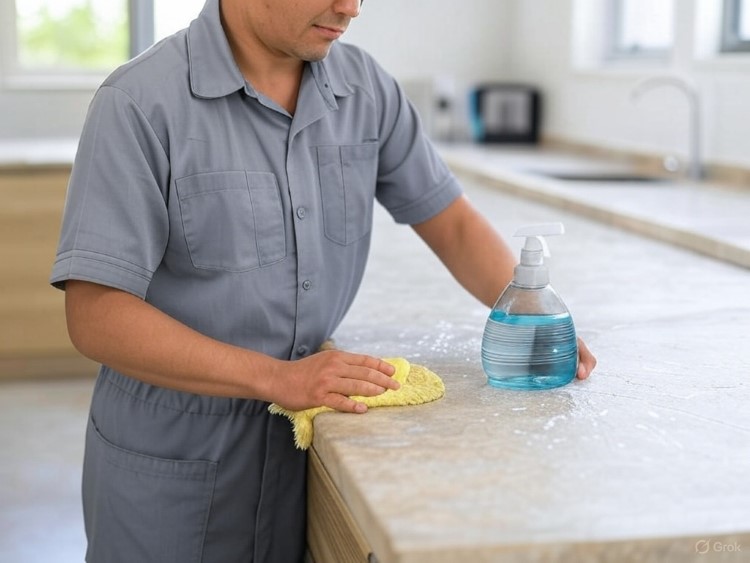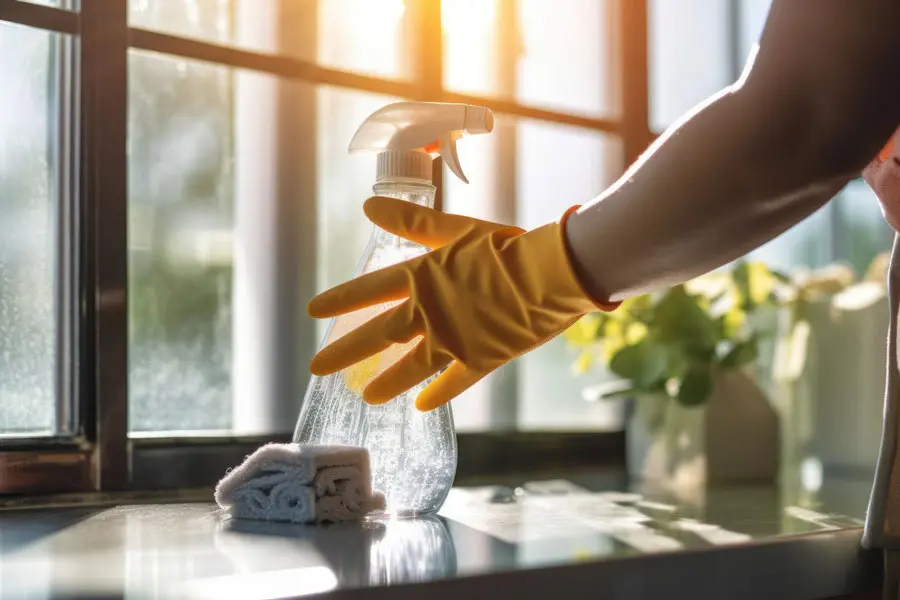Table of Contents
ToggleStone benchtops are a favourite choice for kitchens and bathrooms thanks to their timeless beauty, durability, and ability to elevate any space. But like all premium materials, they require the right care to maintain their natural elegance and long lifespan.
Cleaning stone benchtops isn’t just about keeping surfaces spotless—it’s about protecting your investment. Using the wrong products, such as harsh chemicals or abrasive tools, can damage the surface, strip protective sealants, and even shorten the life of your stone. On the other hand, adopting the right cleaning routine with gentle, eco-friendly solutions will keep your benchtops looking pristine for decades.
Whether you have marble, granite, quartz, or engineered stone, the key lies in knowing the do’s and don’ts of stone care. From daily wipe-downs and stain removal to sealing and long-term maintenance, each step plays an important role in preserving both beauty and function.
This guide covers everything you need to know about cleaning and maintaining stone benchtops—helping you prevent damage, embrace sustainable cleaning habits, and enjoy the natural sophistication of stone for years to come.
Understanding Stone Benchtop Materials & Cleaning Needs
Common Types of Stone Benchtops
Each stone type has unique properties that influence how it should be cleaned:
| Stone Type | Features | Cleaning Considerations |
|---|---|---|
| Granite | Durable, heat-resistant | Avoid acidic cleaners (vinegar, lemon) |
| Marble | Porous, elegant veining | Needs pH-neutral, non-abrasive cleaners |
| Quartz | Non-porous, engineered | Avoid harsh chemicals & scouring pads |
| Travertine | Natural, textured | Requires sealing & mild cleaning agents |
| Porcelain | Lightweight, stain-resistant | Can tolerate slightly stronger cleaners |
Why Avoid Harsh Chemicals?
Traditional cleaning products often contain:
- Ammonia & Bleach – Can discolor and weaken stone.
- Acidic Cleaners (Vinegar, Lemon Juice) – May etch marble and other porous surfaces.
- Phosphates & Synthetic Fragrances – Contribute to water pollution.
Switching to natural cleaning alternatives is not only better for your benchtops but also safer for your health and the environment.
Best Environmentally Friendly Cleaning Options
Warm Water & Microfiber Cloth (Everyday Cleaning)
Best For: Quick daily cleaning of all stone surfaces
How To Use:
- Dampen a microfiber cloth with warm water.
- Wipe the surface in circular motions to remove dust and spills.
- Dry with a clean cloth to avoid water spots.
Why It’s Eco-Friendly? Uses no chemicals, only water and a reusable cloth.
Natural pH-Neutral Soap & Water Solution
Best For: Gentle cleaning of granite, marble, and quartz
How To Use:
- Mix a few drops of Castile soap or other plant-based soap with warm water.
- Dampen a soft sponge or cloth and wipe the benchtop.
- Rinse with clean water and dry with a microfiber towel.
Why It’s Eco-Friendly? Soap made from natural ingredients biodegrades safely and doesn’t harm waterways.
Baking Soda Paste (For Stubborn Stains)
Best For: Lifting oil stains & grime from granite & quartz
How To Use:
- Mix baking soda with a small amount of water to form a paste.
- Apply it to the stain and let it sit for 15–30 minutes.
- Wipe with a damp cloth, then dry.
Avoid on Marble! Baking soda is slightly abrasive and may scratch soft stones.
Why It’s Eco-Friendly? Non-toxic, biodegradable, and a common household ingredient.
Rubbing Alcohol & Water (For Disinfection)
Best For: Sanitizing kitchen benchtops without harsh chemicals
How To Use:
- Mix 1 part isopropyl alcohol (70%) with 3 parts water in a spray bottle.
- Lightly mist the benchtop and let sit for 1 minute.
- Wipe with a dry cloth.
Why It’s Eco-Friendly? Alcohol evaporates quickly, leaving no harmful residues.
Hydrogen Peroxide (For Deep Cleaning & Mold Removal)
Best For: Removing mold & deep stains on granite and quartz
How To Use:
- Spray 3% hydrogen peroxide onto the surface.
- Let it sit for 5–10 minutes, then wipe clean.
Caution: Do not use on marble—it may cause discoloration.
Why It’s Eco-Friendly? Hydrogen peroxide breaks down into water and oxygen, making it a safe disinfectant.
Essential Oils (For a Natural, Fresh Scent)
Best For: Adding a pleasant aroma while cleaning
How To Use:
- Add 5–10 drops of lavender, tea tree, or lemon essential oil to your soap and water solution.
- Wipe as usual.
Why It’s Eco-Friendly? Essential oils are natural and chemical-free compared to synthetic fragrances.
7. Tips for Busy Families
-
Quick daily wipe-down
-
Clean spills immediately
-
Use protective mats & boards
-
Schedule resealing every 6–12 months
-
Remove stains with safe DIY solutions
The Do’s of Cleaning Stone Benchtops
1. Use a pH-Neutral Cleaner
Stone benchtops are sensitive to acidic or alkaline substances, which can degrade their surface over time. For daily cleaning, opt for a pH-neutral cleaner specifically formulated for natural stone. Studies show that using pH-neutral products can extend the lifespan of stone surfaces by up to 25%.
2. Wipe Spills Immediately
Accidents happen, but when it comes to stone benchtops, prompt cleaning is critical. Acids like juice, wine, or vinegar can etch into natural stone if left unattended. Similarly, oils may seep into porous surfaces, leading to permanent stains. Cleaning up spills immediately can reduce staining risks by as much as 60%, according to cleaning experts.
3. Use Soft Cloths or Sponges
When cleaning a stone benchtop, always use soft, non-abrasive materials such as microfiber cloths or sponges. Hard scrubbing materials like steel wool or abrasive pads can scratch the surface and dull its polish.
4. Seal the Stone Periodically
Natural stones like granite and marble are porous and require sealing to prevent staining. Experts recommend sealing stone benchtops once or twice a year, depending on usage and the type of stone. Recent data indicates that sealed stone benchtops are 45% more resistant to stains than unsealed ones.
5. Use Coasters, Trays, and Cutting Boards
To minimize wear and tear on your stone benchtops, use coasters under beverages, trays for kitchen appliances, and cutting boards for food prep. This simple practice can prevent accidental scratches and heat damage.
The Don’ts of Cleaning Stone Benchtops
1. Avoid Harsh Chemicals
Acidic cleaners like bleach, ammonia, or vinegar can lead to etching and discoloration. According to a survey, over 30% of damage to stone benchtops is attributed to improper cleaning agents. Always stick to products designed for natural stone to avoid irreversible damage.
2. Do Not Use Abrasive Tools
Scouring pads and stiff brushes may remove dirt, but they can also scratch and erode the surface, especially for softer stones like marble. Over time, abrasions dull the surface, diminishing the benchtop’s appearance and value.
3. Don’t Ignore Heat Damage
Placing hot pots or pans directly on stone benchtops can cause cracks or discoloration. Protect your surface by using trivets or heat-resistant mats to handle hot cookware. Temperature extremes are a leading cause of damage in stone benchtops, with quartz surfaces being particularly susceptible.
4. Avoid Standing Water
Prolonged exposure to water can darken and weaken some natural stones. Quartz and engineered stones are less porous but can still suffer from discoloration along seams if standing water is ignored. Always dry the surface after cleaning or spills.
5. Don’t Lean or Place Excessive Weight
Stone benchtops are strong but not indestructible. Leaning heavily on edges or placing excessive weight on unsupported areas can cause cracks or breakages. It’s important to follow the manufacturer’s weight guidelines to prevent costly repairs.
How to Clean Natural Stone Benchtops Step-by-Step
Step 1: Gather Your Cleaning Supplies
Before you begin, ensure you have the following:
- A soft microfibre cloth or sponge
- pH-neutral stone cleaner or mild dish soap
- Warm water
- A dry, lint-free towel
- A resealing product suitable for granite or marble (if your stone requires resealing)
Avoid: Harsh chemicals, acidic cleaners (like vinegar, citrus-based products, or bleach), abrasive sponges, and generic household cleaners. These can strip the sealant or cause etching on your stone.
Step 2: Daily Cleaning
Perform light cleaning daily to maintain your benchtops.
- Remove Debris: Sweep or wipe away crumbs or dust particles with a dry cloth. This prevents debris from scratching the surface.
- Wipe Down: Mix warm water with a few drops of pH-neutral dish soap or stone cleaner. Dip a soft cloth into the solution and gently wipe the surface.
- Rinse with Clean Water: Use a second cloth dampened with plain water to remove any soap residue.
- Dry Thoroughly: Dry the surface with a lint-free towel to avoid water streaks or stains.
Pro tip for Melbourne residents: Dust tends to accumulate quicker indoors during windy weather. Wiping your benchtops daily can help prevent micro-scratches.
Step 3: Stain Removal
Accidents happen, and spills can leave stains. Act quickly to minimise damage:
- For Marble: Remove stains by mixing baking soda with water to form a paste. Cover the stain with the paste, then place plastic wrap over it. Leave it for 12–24 hours, then gently wipe it away with a damp cloth.
- For Granite: Use a granite-safe stain remover or make a paste similar to the marble cleaning method.
Important: Always test any homemade solutions on a small, inconspicuous area first.
Preventative Tip
For both marble and granite, wipe up spills immediately. Substances like coffee, red wine, and cooking oils can cause discolouration if left for too long.
Step 4: Resealing (When Needed)
Natural stone benchtops are typically sealed during installation, but over time, the sealant can wear off. A good rule of thumb is to reseal every 1–3 years, depending on use and Benchtops stone type.
How to Check if Your Benchtop Needs Resealing:
- Pour a few drops of water on the surface.
- Leave it for 15 minutes.
- If the water seeps into the stone, it’s time to reseal.
To reseal:
- Follow the instructions on your chosen sealing product.
- Apply the sealant evenly and buff it into the surface with a clean cloth.
Melbourne Insight: The humid climate can sometimes speed up the degradation of sealants. Regular resealing is particularly important in areas like bathrooms and kitchens.
Other Tips for Maintenance
- Use Coasters & Trivets: Prevent scratches and heat damage by using coasters under glasses and trivets under hot pans.
- Avoid Heavy Weights: Don’t sit or place heavy items on your benchtops, as natural stone can crack under excessive weight.
- Routine Dusting: If your benchtops aren’t used daily, dust them regularly to prevent long-term abrasion.
The Long-Term Benefits of Proper Care
By following these cleaning and maintenance routines, your natural stone benchtops can remain stunning for decades. Protecting your investment not only preserves the aesthetic appeal of your home but also enhances its value, with properties boasting natural stone installations often attracting premium pricing in Melbourne’s competitive real estate market.
Stains and Sealing: Protecting Your Stone Benchtops
Common Stains from Your Kitchen and How to Remove Them
Common kitchen stains on stone benchtops often come from acidic spills like lemon juice, coffee, or wine. To remove these stains, act quickly by blotting the spill with a soft cloth.
The Importance of Stone Sealing for Durability
Stone sealing is crucial for the durability of natural stone benchtops like marble and granite because it creates a protective barrier.
When to Reseal Your Marble and Granite Benchtops
Resealing your marble and granite benchtops should be done periodically. Depending on usage, resealing every one to three years is generally recommended by the stone industry.
Frequently Asked Questions (FAQs)
Q1: What is the safest natural cleaner for stone benchtops?
A mild pH-neutral soap with warm water.
Q2: Can I use vinegar on stone benchtops?
No. Vinegar is acidic and causes etching.
Q3: How often should I reseal stone?
Every 6–12 months for high-use kitchens.
Q4: How do I remove stains from marble?
Use a baking soda poultice for oil stains; hydrogen peroxide for organic stains.
Q5: Are quartz benchtops maintenance-free?
They’re low-maintenance but still sensitive to heat—always use trivets.
Building Connection Through Community
At Emporium Stone, we understand that balancing family life and home maintenance can feel overwhelming at times. Our goal is to make your life easier, helping you preserve the elegance of your marble, granite, quartzite, and porcelain benchtops even in the busiest of homes.
Want more tips, tricks, or professional advice? Feel free to explore our blog for further guidance, or schedule a consultation with one of our experts for bespoke solutions.





